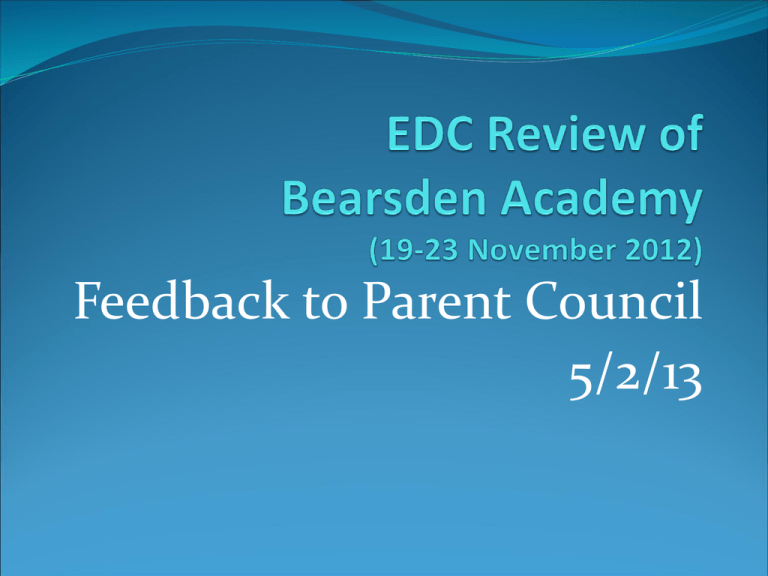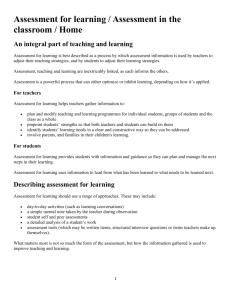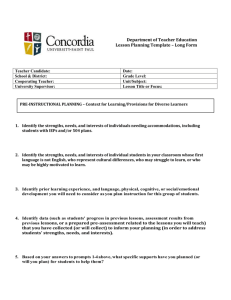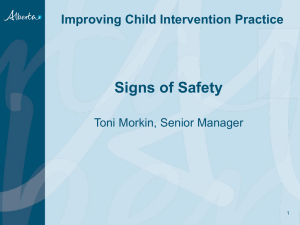EDC Review 19-23 November 2012
advertisement

Feedback to Parent Council 5/2/13 Strengths QI 1.1 Improvements in performance Standards of attainment are consistently strong. Strong emphasis on providing a wide range of opportunities for young people within and out with school. Almost all young people move into positive destinations. Planning has a clear focus on outcomes for young people. Strengths QI 2.1 Learner’s experiences Young people are motivated and interact well with teaching staff. They feel valued, respected and spoke highly of the support they receive. Young people are becoming increasingly responsible for their own learning through changes to learning and teaching practices. Strengths QI 2.1 Learner’s experiences Young people value the voice they have in the school. They can see that their views are considered and acted upon. Your articulate young people are able to make and express links in learning from across the curriculum. Strengths QI 5.1 The curriculum Staff have worked hard to review and refresh programmes of work, embedding experiences and outcomes into planning and ensuring articulation with NQ levels. Curricular developments are led by teachers. The Numeracy, Literacy and HWB committees support staff to develop appropriate skills. Strengths QI 5.1 The curriculum There are a wide range of partnership arrangements which continues to grow and provide a range of opportunities for young people. Cluster working with associated primary schools complements strong pastoral support at the point of transition and curricular developments. Strengths QI 5.3 Meeting learners’ needs Broad banding and setting are used effectively to provide appropriate support and challenge to young people. A wide range of systems are in place to provide a range of opportunities to support young people and meet their needs. Strengths QI 5.3 Meeting learners’ needs The extended guidance system supports young people through the profiling process. Young people within the LCR are very well supported and feel that they are an integral part of the school. Strengths QI 5.9 Self Evaluation Staff are positive about and are committed to improving the quality of learning experiences in the school through participation in teacher learning communities, working groups and committees, etc. The quality assurance calendar provides the school and departments with a structure to successfully identifying strengths and areas for improvement. Strengths QI 5.9 Self Evaluation Professional dialogue and collaborative working provide staff with opportunities to develop skills and confidence in the use of new assessment techniques. Moderation activities, supported by monitoring and tracking systems provide evidence which supports professional dialogue within departments and with senior management. Action Points QI 1.1 Improvements in Performance Look more closely at integrated planning for assessment. Action Points QI 2.1 Learners' Experiences Aim for high quality feedback to learners to improve their learning. Pupils should have more opportunities to lead on learning. Action Points QI 5.1 Curriculum IDL. Reporting on progression across levels and personal achievement. Consider widening the scope of the membership of the Health and Wellbeing committee (pupils & parents?) Continue dialogue to develop planning for progression across all CfE levels. Action Points QI 5.3 Meeting Learners’ Needs Personal support. Ensure appropriate targeted and universal support for all learners. Build on its improving links with partners (MCMC) Action Points QI 5.9 Self Evaluation Develop consistency in departmental standards and quality reports. Develop further monitoring and tracking. Ensure all stakeholders involved in evaluating work.











